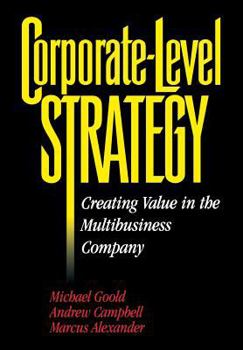Corporate-Level Strategy: Creating Value in the Multibusiness Company
Select Format
Select Condition 
Book Overview
Advance praise for Corporate-Level Strategy. "At last a book that cuts through all the corporate jargon and academic generalizations to answer the question 'Does the corporate parent create or destroy value for the organization?' The authors suggest a simple yet compelling framework for making this determination. Must reading for students and practitioners alike." -Robert Cizik Chairman and Chief Executive Officer Cooper Industries "In an era when the role of corporate-level management is quite justifiably being questioned and challenged, it is refreshing to find a book that clearly shows how parent companies can add rather than destroy value in their businesses. As we would expect of these world class authorities, Goold, Campbell, and Alexander have leveraged their fascinating research findings into an eminently readable and highly practical book." -Chris Bartlett Professor Harvard Business School "A vital and deeply researched contribution to thinking about corporate strategy." -Gary Hamel London Business School "I am very impressed by the extensive work on which this book is based, and by the concept of parenting advantage that it puts forward." -Yasutaka Obayashi Senior General Manager, Corporate Strategy Canon "Great companies grow, they don't just cut. With breakups and restructuring done, corporate parenting is coming back. Goold, Campbell, and Alexander have produced a comprehensive and intelligent book which should become a standard guide on the subject." -Tom Hout Vice President The Boston Consulting Group "A perceptive and valuable insight into an often underestimated area of strategy. This book clearly demonstrates the importance of parenting to the longer term development and prosperity of multibusiness companies." -Alan R. Jackson Chief Executive, BTR "I am glad someone has so well and so fully shed light on this important body of thinking." -Sigurd Reinton Director, McKinsey & Company, 1981-1988
Format:Hardcover
Language:English
ISBN:0471047163
ISBN13:9780471047162
Release Date:September 1994
Publisher:Wiley
Length:464 Pages
Weight:2.00 lbs.
Dimensions:1.3" x 6.5" x 9.5"
Customer Reviews
4 ratings
Interesting and Enlightening
Published by Thriftbooks.com User , 17 years ago
This is an enlightening and well written book on corporate-level strategy. The authors clearly and methodically discuss whether corporate parent creates or destroy value for the organisation. This is a useful reference book for management consultants or for managers involved in formulating strategies for Multibusiness companies. Students studying for an MBA or business strategies should find the book useful, helpful and handy.
Corporate Centres
Published by Thriftbooks.com User , 22 years ago
I have used this book many times in designing the corporate headquarters compnent of organizations. It is one of a very few references available on this particular issue to consultants in organization design. As a Value Based Design consultant, analyst, researcher and advisor on value creating systems I must take issue with the previous reviewer and strongly recommend this book to actual practitioners.Goold happily steers us away from mathematical reductionism and provides some great examples of how economic value can be leveraged as diverse means of generating it are discovered in the corporate portfolio. Like Jaques caution not to throw the hierachical baby out with the bathwater,Goold provides an antidote to the view that corporate centres add no value. As companies become more process based and self organizing, insights such as those provided by the author into managing such complexity will be invaluable.
Parenting Advantage: academic case studies - no formulas
Published by Thriftbooks.com User , 23 years ago
This books title should be: "Parenting Advantage: Non-quantifiable benefits of british conglomerates in the 1980's".I ordered this book because I excpected to find an advanced mathematical textbook on strategic analysis, shareholder value and real options. Therefore I was disappointed to find out, that it does not contain a single formula and ignores all the progress made by shareholder valuation techniques and real option theory.It is based on verbal organizational theory and sociology, not on microeconomic theory and transaction cost theory.It is based on an INTERNAL point of view, not an EXTERNAL point of view, and fails to analyze quantitative competetive advantages. Its framework is very academic and descriptive, no step-by-step-imlementation plans, no mathematics. Just interviews with british conglomerates and quotations from academic papers. However, the book taught a valuable lesson, it did not intend to teach at all: The popular EVA/Economic-Profit-Models for Share-holder-Valuation-Management were first applied by british cong-lomerates like BTR back in the late 1960's. The misapplication of EVA/economic-profit-models in british companies and their resulting loss of competetive advantage is a cautionary tale against the abuse of simplified shareholder-Valuation-techniques. With all due respect towards the authors, I see few hands-on-applications for their work. Sure, I do not question Goolds integrity or experience. He must have invested months of work in his book. His book was stimulating to read, but how can it help a consultant, who sits face-to-face in front of an angry customer, who wants to see quantifiable results for his money ?.I share Mr Goolds scepticism aginst an aggressive 'financial control style', but to falsify EVA/Economic-Profit-Modelsit takes more than anecdotal evidence, it takes stochastic data.
Excelent for world of today business
Published by Thriftbooks.com User , 24 years ago
This is an excelent book based on practical knowledege and very clever tools to evaluate different strategies in a multibusiness company.






